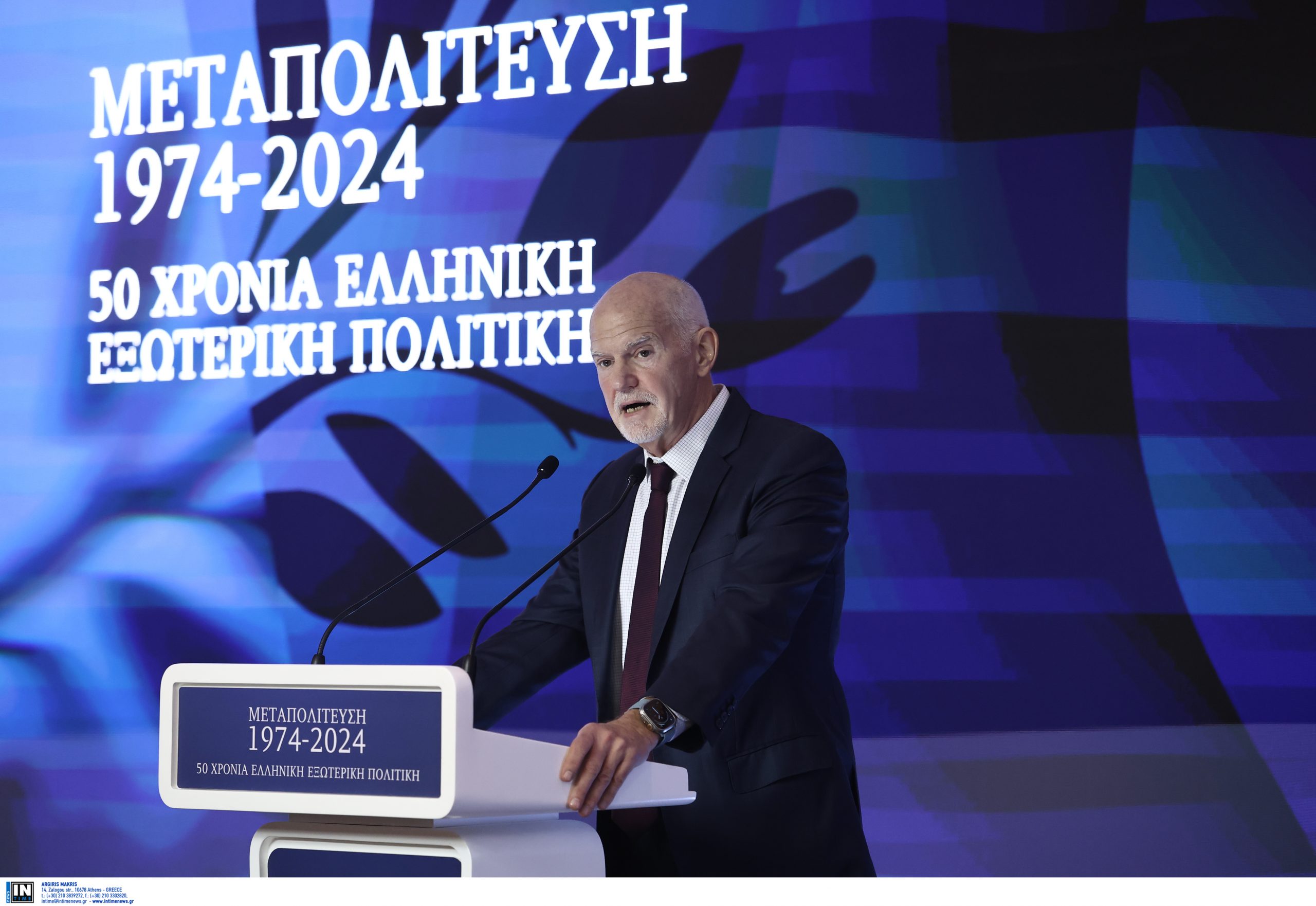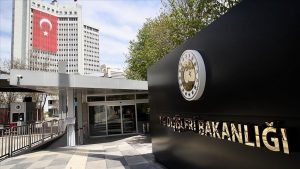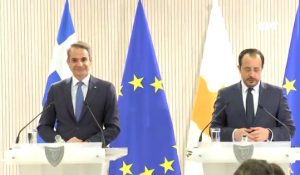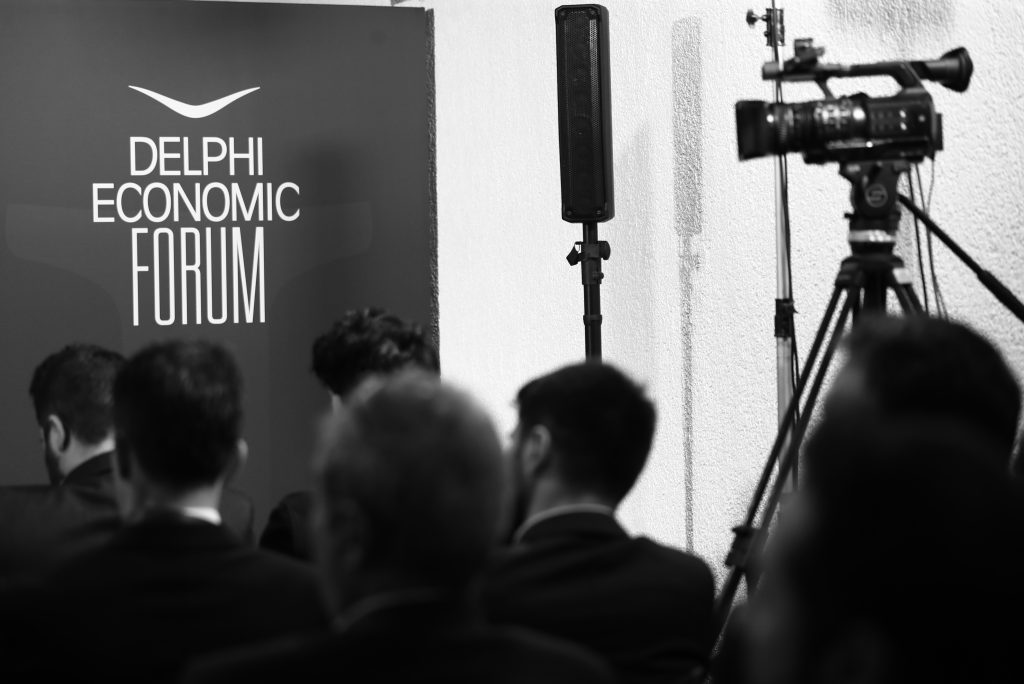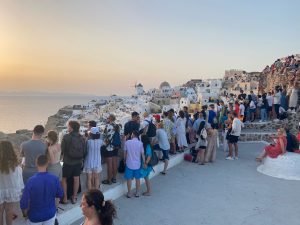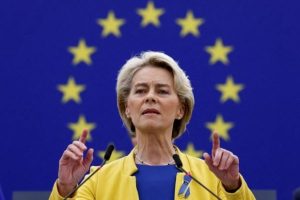The following is the full speech of former PASOK president George Papandreou at the To Vima conference, Metapolitefsi 1974-2024: 50 Years of Greek Foreign Policy.
Ladies and gentlemen,
Foreign policy is not a cold, formal process. It is deeply connected to the narrative of each people – their hopes, experiences, and dreams.
Narratives that are not at all accidental, because they are based on historical experiences, triumphs and trials that shaped the identity of each nation.
However, these experiences are not dry facts. They are analyzed, interpreted and often become the subject of internal debate about the causes and the culprits. Through this process, every people, every state, is called upon to identify its priorities, determine its vital interests and chart a course that will unite its action and its goals.
Foreign policy is an act of responsibility and foresight, of constantly seeking ways to combine national interest with international cooperation and peace.
The first post-independence period in Greece begins with the wounds of traumas that have marked Hellenism open. The coup of the colonels in 1967, which paved the way for free elections and the all-conquering victory of the Union of the Centre, marked the beginning of a dark period of abolition of democratic freedoms, with imprisonment, torture, exile and, finally, the tragedy of Cyprus.
The Turkish invasion that followed the Ioannidis coup d’état led to the partition and occupation of part of the island, leaving indelible scars on the nation’s historical memory.
However, the reading of these events differed sharply among the political factions of the time, with two dominant interpretations being contrasted.
For New Democracy, the Metapolitefsi period was primarily about the restoration of democracy and the return of Greece to the European family through its accession to the then EEC. The dictatorship is seen as a ‘bad parenthesis’, an unfortunate break in the country’s historical continuity, blamed mainly on internal political rivalries.
On the contrary, PASOK adopts a different interpretation. In its founding Declaration, “The tragedy of Cyprus and the dangers that have arisen for the nation” are not the end of a parenthesis, but the beginning of a new struggle. The national wounds are due to the illiberal internal structures that allow the country’s dependence on the Cold War apparatus of the United States.
For PASOK, therefore, the Metapolitefsi period is the beginning of a vision for detachment from foreign influences, the deepening of democracy and social liberation. As Hellenism everywhere in the world, together with Hellenism in the Diaspora, we must take our destiny into our own hands.
These two different approaches are not just historical narratives. They are foundations that shaped political choices, strategies and the ideological directions that determined the course of the country in the following decades.
I want to refer to an essential difference that has characterized political perceptions in Greece over time, not necessarily between parties, but between currents that date back to the establishment of the modern Greek state.
On the one hand, there is the traditional patronage logic, which in international relations is expressed through the search for a “patron” – French, English or Russian, in the past. This perception is characterized by passive acceptance of a status quo and submission to hegemonic relations. A perception that still prevails today in many Balkan states.
On the other hand, there is a perception that was a foundation for PASOK: the concept of liberation. This challenges the status quo and seeks to mobilized the forces of Hellenism, shaping a free, democratic, autonomous and independent Greece.
PASOK, moreover, was not limited to national borders. It linked its action to the international progressive movements – peace, disarmament, defense of international law and self-determination of peoples – and developed alliances that strengthened Greece’s position in the world.
This different vision guided the foreign policy pursued by the governments of the PASOK Party. Disarmament, democracy, peace and a strong welfare society were not just principles, they were vital prerequisites for the security and prosperity of Hellenism.
Through this strategy, PASOK did not limit itself to addressing the immediate challenges of its time. It laid the foundations for a Greece that stands strong, self-reliant and with an active role in building a fairer, more peaceful world.
And if, as you will see below, I am talking mainly about the strategy of the PASOK, I ask for understanding, because I am not responsible for the absence or the fearfulness of the other side, unless one can argue that absence and fearfulness constitute a strategy.
But let us see how the principles of PASOK were translated into practice through three decisive periods of the post-independence period, which shaped our foreign policy.
During the Cold War, Greece’s belonging to the West and the NATO alliance did not guarantee either its security or its democracy, as the tragedy of Cyprus and the dictatorship proved.
PASOK’s response was to seek greater autonomy, away from dependence on “patrons”, so that Greece could play a leading role in the formulation of an independent and dynamic foreign policy and not react to challenges in a fragmented manner. A perception which, in my opinion, is also the legacy of the Pasok party in the country.
Thus, an attempt was made to strengthen defence autonomy (e.g. development of local industry, purchase of Mirage), strict conditions were set for US bases and national defence and protection of Cyprus were shielded.
As part of a multidimensional foreign policy, we opened channels of communication with the Non-Aligned and Arab peoples, supported the Palestinian struggle, and developed mediation initiatives in international crises, such as between France and Libya on Chad, cooperation in the Balkans and the Mediterranean, and we have led the global movement for peace, disarmament and nuclear disarmament with the “Initiative of the Six”, reinforcing our image as a peaceful power of international stature.
The critical attitude of PASOK towards the EEC at that time did not translate into distancing itself from the EEC, but after 1981 into active ascension.
For economic cohesion, with the Mediterranean Integrated Programs (MIPs), precursors of the NSRF, which secured significant resources for Greece; for the democratic functioning of the EU, with the strengthening of the European Parliament and the deepening of democracy in Europe, but also bold initiatives, such as the approach with Jaruzelski in Poland, which, although controversial, proved to be far-sighted, contributing to Poland’s smooth transition to democracy.
In the second period, after the fall of the Berlin Wall, a new chapter opened for Europe, bringing fresh perspectives, optimism and greater freedom of movement for Greece on the international stage.
In this context, President Clinton’s visit to Greece was a milestone. I had personally contributed to the mediation that led to a historic moment: President Clinton made a public apology for the United States’ involvement in the 1967 dictatorship.
This move, apart from its strong moral symbolism, laid the foundations for the political and psychological normalization of Greek-US relations. It was a recognition of historical truth that not only restored trust but also paved the way for a new era of cooperation based on mutual respect.
As the unification of Europe was approaching, Greece formulated a systematic and organized strategy aimed at Cyprus’ accession to the European Union. For the PASOK, Cyprus has always had a special, symbolic and essential role – I recall again the Founding Declaration of 3 September which begins with the phrase: “The tragedy of Cyprus…”
The biggest challenge was to prevent the linking of the accession of Cyprus to the resolution of the Cyprus problem, so that this would not turn into an indirect veto by Turkey.
Our strategy was based on the belief that Cyprus’ EU membership could also act as a catalyst for the resolution of the Cyprus problem.
This vision was not only a matter of policy, but also an act of historical responsibility. Cyprus’ accession to the EU became a turning point, not only for the Republic of Cyprus but also for Greece, as it strengthened our position as a responsible, leading player on the European chessboard.
I consider the Helsinki decisions and the EU Presidency in 2003 as two highlights of Greek foreign policy. These successes were not the result of luck or the inspiration of two people, no matter how hard we worked with Prime Minister Costas Simitis to achieve them.
I want to be clear: these milestones were the result of a long-term strategy, planned and implemented with dedication and precision for more than ten years. Our diplomacy has worked with surgical precision, consistently serving a national objective.
We did not limit ourselves to our skilled diplomats. We mobilized every available force: the Government as a whole, Hellenism in the Diaspora, civil society, business and social actors. We all worked together to shape the conditions that would strengthen Greece’s position in Europe and the world.
But the most important thing was the philosophy that guided us. Our policy was not limited to monitoring developments. We chose to play a leading role in shaping a new reality in Europe, which gave us prestige, credibility and diplomatic power.
Between Greece and Turkey, we achieved a radical change in the psychological and political climate, not only through “earthquake diplomacy” but also through “citizen diplomacy”, building bridges of communication between the two peoples.
With clarity and absolute honesty about where we agree and disagree, we have begun exploratory talks. We moved in parallel to beneficial partnerships, bilaterally and in the wider region with an active joint presence in the Middle East and the Balkans.
The results of this approach have been significant:
Our relations moved in calm waters for many years.
Bilateral trade increased from €3 million to €3 billion.
Tourism between Greece and Turkey flourished, boosting in particular the eastern Aegean islands.
Greece actively supported Turkey’s European course, but with clear conditions: respect for democracy, human rights and good neighbourliness. We were no longer the deniers of its European perspective, but sincere supporters, promoting a democratic European Turkey and the prospect of a free, united Cyprus.
And of course, Greece succeeded in Helsinki in setting Cyprus on a path to EU membership, irrespective of the Cyprus settlement. At the same time, it secured Turkey’s commitment to peaceful dialogue on the continental shelf, and on condition that, if it is not resolved through dialogue, it is referred to the International Court of Justice.
We combined a three-pronged strategy: outward-looking and active participation, which gave us European and international standing; a strong defence that covered our backs; and by defending our interests we invested, without fear and with frank dialogue, in the prospect of a new relationship of peace, cooperation, development and solidarity between us.
Greece’s active presence in the shaping of a new, united Europe has contributed decisively to our diplomatic strength.
We have consistently focused on the timeless values for a Europe that is more autonomous, more democratic, and capable of promoting peace and social cohesion.
The Thessaloniki Declaration of 2003, which paved the way for the enlargement of the EU to the Western Balkans, was historic. Although only Croatia has joined, this commitment remains a benchmark for the region.
Of particular importance for then and for Europe’s future was our contribution to common defence, with the article on mutual assistance that we negotiated for the European Constitution, but also the obligation for Europe to formulate a Common Defence Doctrine, a proposal adopted by Javier Solana at the Gymnych held in Kastelorizo.
We have also enriched the Foreign Policy agenda by being a pioneer in putting environmental issues on the international agenda, we have strengthened our humanitarian presence with intensive assistance in conflict areas such as the Balkans and the Middle East, and we have included in our cultural diplomacy the successful hosting of the 2004 Olympic Games.
The extent to which successive governments have taken advantage of the successes and opportunities created will be analysed by the next speakers. However, I cannot but point out that the fearfulness and lack of political courage that characterised the next leadership, both in Cyprus and Greece, deprived the possibility of achieving a viable solution at a uniquely favourable historical juncture in 2004.
Had there been negotiation with determination and vision then, as major changes require, and had that opportunity not been lost, today Cyprus would have been free of the military occupation forces and could have radically changed its future. Instead, Turkey is now promoting the creation of an independent Turkish Cypriot state as the “solution.”
I now come to the third defining period of the post-independence period, that of the emergence of a multipolar world.
The crucial question today is: Can we turn this multipolar world into a system of multilateral cooperation?
That is to say, instead of competition and conflict between different poles of power, can we establish agreements and rules of law that are respected by all?
From my experience and my travels to every corner of the globe, I have found that, despite the unique histories and interests of each country and people, there are timeless common needs: security, survival, self-determination, freedom, progress, prosperity and a sense of justice.
The challenge of our time is whether these universal values will be translated and served through war and violence or through peace and dialogue.
Will they be based on respect for the other and coexistence or on the imposition and hegemony of the strong?
On the one hand, there is the perception that we will live in a conflictual and anarchic global reality, as John Meirsheimer describes it.On the other hand, there is the belief that we can and should seek a world that is rule-based, guarantees cooperation and promotes respect for law, as Joe Nye would argue.
Greece’s interest – and I believe there is broad political consensus on this – is to build a world order that respects international law. This is also a vital issue for the survival of Europe, which is founded on these values.
I firmly believe that it is up to us to collectively decide the path to follow. With the cooperation of all, but also with the initiative of leading forces internationally, we can claim and create a world based on respect, justice and peace.
America missed a great historical opportunity to form a similar framework when it found itself omnipotent. It invested in reckless military adventures. And the current leadership seems allergic to institutions like the UN.
A strong and united Europe could equally promote stability, cooperation and peace.
However, the EU suffers from internal weaknesses that limit its influence, not only in the periphery but also globally.
This weakness should not be taken for granted.
It is time for Europe to overcome its internal problems and emerge as a leading power in a multipolar world.
Europe can and must shape a new reality – a reality based on dialogue, cooperation and respect for international law.
During the third period, Greece, despite the crisis – which also undermined our credibility – managed it with vision and proposals that even today provide a way out. We have shaped new support mechanisms vis-à-vis the markets and laid the foundations for Eurobonds. At the time, we were not listened to as much and as we should have been. But our ideas, such as the Eurobonds described in the Draghi Report, remain crucial for a Europe that wants to be economically competitive, socially cohesive, defensively secure and technologically innovative.
And in this new reality, Greece has shown that it can play an active role. With progressive thinking and cooperation, we have laid the foundations for a future of peace, cooperation and sustainable development. We formed the trilateral relationship with Israel and Cyprus, while in the Mediterranean we took a joint initiative with then Prime Minister Erdogan on climate and renewable energy with 25 Mediterranean countries.
In closing, I feel obliged to set the tone for the outlook for Greece as we enter a new phase of human history. A phase defined by tremendous technological progress: artificial intelligence, biotechnology, quantum computing.
The great dilemma of this era is clear: will we harness these capabilities to address global challenges – from the climate crisis to sustainable development and equitable prosperity – or will we let them reinforce the over-concentration of power and a relentless competition that threatens the very existence of humanity?
For a country like Greece, in a more unpredictable world, I believe that it is necessary not only to see alliances but also to use new technologies to strengthen our autonomy, our self-sufficiency in vital sectors, in terms of democratic and participatory, such as Energy and Defence.
And I want, speaking of the future, to refer to another “Great Idea” for Hellenism – an idea that is not geographical but value-based. An idea that does not expand our physical borders, but expands the borders of our values.
Hellenism can be the voice of wisdom against the hubris of over-concentration and arbitrary power. In a world where the enormous potential of technology poses existential and moral dilemmas, we can become a force of values that seeks to harness the vast technological wealth for peaceful and democratic coexistence and the common good, across borders, rather than for the interests and conflicts of the powerful.
Some may consider this vision unrealistic. But I believe it is the only truly realistic solution for the survival of humanity.
This new patriotism – which is identified with the future of humanity – can be beneficial both for Hellenism and for the whole world.
Faced with the real existential challenge for humanity and by making the most of our position in the European Union, the Mediterranean and our region, we can become a beacon of civilisation.
Greece for so many peoples is “an idea”.
With our history and tradition, we have all the ingredients to lead in this new era.
Returning to the beginning of my speech, regarding our narrative, this must be reflected within our country, with confidence and commitment to patriotic values:
Greece, a country of law, democracy, social cohesion, culture and education.
With boldness and without fear, Greece can lead the way in the dialogue between cultures and states. It can become a place of culture and education for a new era in search of direction and values.
Let us give Greece the role it deserves – not just as a spectator of history, but as a creator of a better future.

